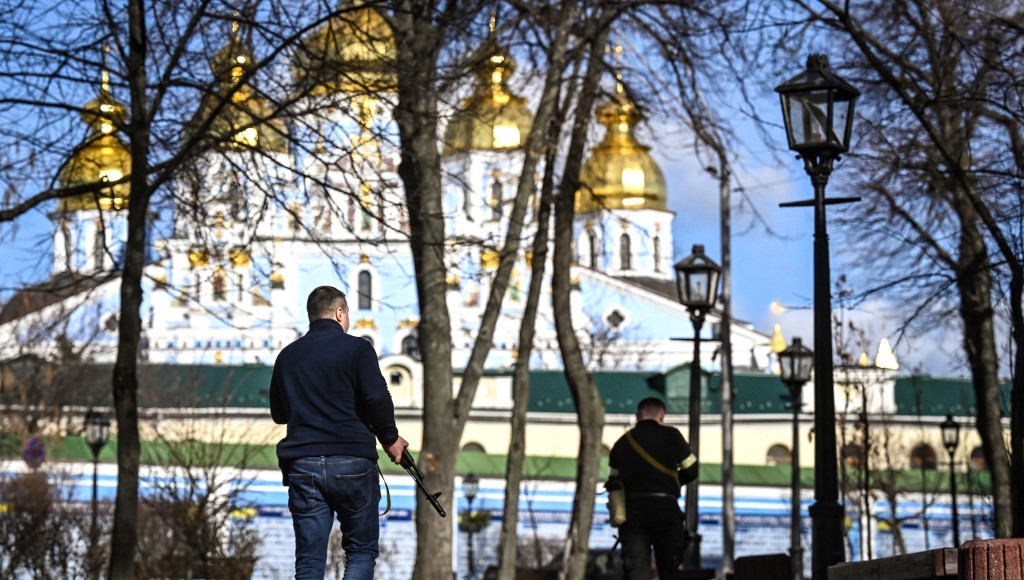Türkmen Terzi
Russian President Vladimir Putin had long denied intentions to invade neighboring Ukraine, and it therefore came as a great shock to the world when he ordered the Russian army to attack Ukraine in the last week of February. Many around the world and in Russia argue that this is Putin’s personal war on Ukraine, while a large number of Russians hold him in high esteem for trying to re-establish the Russian Empire. Anti-war activists took to the streets in cities from St. Petersburg to Moscow and even Siberia to protest the Russian invasion of Ukraine, thousands of whom were arrested by the Russian authorities. Putin, who remains deeply influenced by Russian philosopher Ivan Ilyin, who formulated Russian patriotism based on promotion of the Orthodox Church and traditional values, is now using religion to wage a war on Ukraine. His fight, however, not only divides the Orthodox Church since he is attacking another Orthodox country, but tensions have also arisen between the Muslim citizens of Russia and Ukraine.
Ilyin left Russia in 1922 along with 160 Russian intellectuals since he was regarded as an enemy of the Bolshevik state. He lived in Berlin from the late ’20s to the early ’40s and then moved to Switzerland in 1943. Ilyin denied the existence of a Ukrainian nation and believed that Ukraine did not have the right to form a state, warning that Europe’s control of Ukraine would be detrimental to Russia. Foreign Policy cited from Ilyin’s book, which said that “Germany would move into Ukraine and the Baltics, England would bite off the Caucasus and Central Asia, Japan will target the Far Eastern shores.”
It appears that Putin is currently making decisions based on Ilyin’s ideas. He justified the invasion of Crimea in 2014 by saying that Crimea is a sacred land for Russians. Russia’s historical hero, Prince Vladimir, ruler of Kievan Rus from 980 to 1015, rejected paganism, was baptized in Crimea and adopted Orthodoxy as the official state religion. Ukrainians as well as Russians claim Prince Vladimir as their ancestor. Ukrainians believe they are the true representatives of Vladimir, but Putin claims Russia is the real heir to the medieval Rus state.
The divisions among the Orthodox Church have deepened since Russia annexed Crimea. The Ukrainian Orthodox Church had developed great autonomy, although for centuries it remained under the authority of the leaders of the Russian Orthodox Church in Moscow, but it was granted independence from the Russian Church in 2019 by Ecumenical Patriarch of Constantinople (İstanbul) Bartholomew, the head of the global Orthodox Church. Since his recognition of the independence of the Ukrainian Orthodox Church, Orthodox churches from Africa to Europe have severed ties. “The independence of our church is part of our pro-European and pro-Ukrainian policies,” then-Ukrainian President Petro Poroshenko, who attended the patriarchate ceremony in İstanbul, said. İstanbul remained the center of the Orthodox Church after the Ottomans conquered the city, known as Constantinople at the time, in the 15th century.
Putin argues that he is defending the Moscow-oriented Orthodox Church through his military operations in Ukraine, but Ukrainian Orthodox churches have strongly opposed this invasion.
Russia and Ukraine both have a majority Orthodox Christian population, but they also have considerably large Muslim populations. According to the grand mufti of Russia, Sheikh Rawil Gaynetdin, the Muslim community in Russia has reached 25 million. Ukraine has an almost 1 percent Muslim population, but the Crimean Peninsula has been home to Muslim Crimean Tatars for centuries as the Crimean Khanate ruled the peninsula from 1441 to 1783. Currently 12 percent of Crimea is Muslim despite Russia’s continuing deportation of Tatars.
Russia’s Chechen Muslims, famous as warriors who have defended oppressed Muslims in Iraq, Syria and Bosnia, surprised Muslims around the world when Chechen leader Ramzan Kadyrov, Putin’s key Chechen ally, vowed to fight against the Ukrainians under Putin’s command. Russia’s state television station RT on Feb. 25 aired images of thousands of Chechen fighters gathered in the main square of Grozny to show their willingness to offer assistance to Russia’s military operations. Al Jazeera reported on Feb. 28 that Ukraine’s Azov fighters, a far-right all-volunteer infantry military unit who are accused of espousing a neo-Nazi and white supremacist ideology, are conducting military exercises to counter Muslim Chechen fighters.
Ali Viskhadzhiev, president of the Caucasian–Chechen Solidarity Committee based in İstanbul, told Turkish journalist Kenan Taş this week that there are two Chechen groups in Ukraine to fight against Putin’s forces. Viskhadzhiev commented on Ukraine’s willingness to help Chechens and stated that Kadyrov’s support of Putin is unacceptable as Russia has killed more than 300,000 Chechens in near history. Refat Chubarov, president of the Mejlis of the Crimean Tatar People, also called on men eligible for military service and residing in Russian-occupied Crimea to do their best not to join the war launched by Russia against Ukraine and asked them to temporarily leave Crimea if possible.
Many Turks have criticized Kadyrov’s support for Putin as the Chechen nation is historically known for its resistance to imperial Russia under the command of Imam Shamil, the political, military and spiritual leader of the North Caucasian resistance during the 1800s.
It is clear that Putin’s war on Ukraine is not a simple military invasion but has a religious dimension as well. Since the independent-minded Ukrainian Orthodox have formed separate churches during the last century and gained recognition from Bartholomew as independent from the Moscow patriarch, members of Moscow and Constantinople-affiliated churches in the US, Africa and many other parts of the world have been left unable to receive communion at the others’ churches. Just as Putin has ordered Kadyrov to fight against Ukraine, European states and Turkey’s Islamist President Recep Tayyip Erdoğan can mobilize their Muslim populations against Putin.

